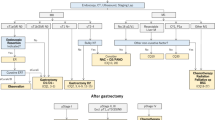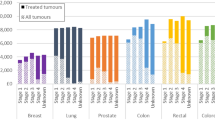Abstract
Purpose
We measured health utility scores of colorectal cancer (CRC) patients from a societal perspective in Japan.
Methods
Twenty-five states of health were described: four metastatic states without severe adverse events (AEs), 16 metastatic states with Grade 3/4 AEs, four adjuvant states, and one terminal state. A total of 1,500 respondents stratified by age and gender were recruited randomly from the largest Web-panel in Japan. Respondents were allocated randomly to three of the 25 health states and answered questionnaires by standard gamble (SG) and time trade-off (TTO) methods.
Results
Although utility scores of metastatic CRC receiving XELOX (capecitabine plus oxaliplatin) chemotherapy were 0.48(SG and TTO) (with stoma) and 0.57(SG) or 0.59(TTO) (without stoma), utility scores of those receiving FOLFOX4 (5-fluorouracil/folinic acid and oxaliplatin) chemotherapy were 0.42(SG) or 0.43(TTO) (with stoma) and 0.52(SG) or 0.53(TTO) (without stoma). These differences between XELOX and FOLFOX4 were statistically significant (P = 0.0198 in SG and P = 0.0059 in TTO). Stage 3/4 AEs decreased utility scores to 0.35–0.4 and 0.4–0.45 in the presence and absence of stoma, respectively.
Conclusions
XELOX was generally considered a significantly preferable chemotherapy regimen compared to FOLFOX4 for CRC in Japan. Almost all Grade 3/4 AEs and stoma significantly decreased utility scores. These differences are dependent on the accuracy of the health state description and to confirm these results. In future research, it would be preferable that preference-based HRQoL measures are used directly in patients if utility scores are practically measurable by such method.


Similar content being viewed by others
Abbreviations
- CRC:
-
Colorectal cancer
- MCRC:
-
Metastatic colorectal cancer
- AEs:
-
Adverse events
- FOLFOX:
-
5-Fluorouracil/folinic acid and oxaliplatin
- XELOX:
-
Capecitabine (Xeloda®) plus oxaliplatin
- SG:
-
Standard gamble
- TTO:
-
Time trade-off
- HS:
-
Health state
References
Ministry of Health, Labor and Welfare. (2007). Population Survey Report [in Japanese].
Center for Cancer Control and Information Services, National Cancer Center, Japan. (2007). Regional Cancer Records and Estimated National Figures [in Japanese].
Buyse, M., Thirion, P., Carlson, R. W., Burzykowski, T., Molenberghs, G., et al. (2000). Relation between tumour response to first-line chemotherapy and survival in advanced colorectal cancer: A meta-analysis. Meta-analysis group in cancer. Lancet, 356(9227), 373–378.
Saltz, L. B., Cox, J. V., Blanke, C., Rosen, L. S., Fehrenbacher, L., et al. (2000). Irinotecan plus fluorouracil and leucovorin for metastatic colorectal cancer. Irinotecan study group. New England Journal of Medicine, 343(13), 905–914.
Douillard, J. Y., Cunningham, D., Roth, A. D., Navarro, M., James, R. D., et al. (2000). Irinotecan combined with fluorouracil compared with fluorouracil alone as first-line treatment for metastatic colorectal cancer: A multicentre randomised trial. Lancet, 355(9209), 1041–1047.
Tournigand, C., Andre, T., Achille, E., Lledo, G., Flesh, M., et al. (2004). FOLFIRI followed by FOLFOX6 or the reverse sequence in advanced colorectal cancer: A randomized GERCOR study. Journal of Clinical Oncology, 22(2), 229–237.
de Gramont, A., Figer, A., Seymour, M., Homerin, M., Hmissi, A., et al. (2000). Leucovorin and fluorouracil with or without oxaliplatin as first-line treatment in advanced colorectal cancer. Journal of Clinical Oncology, 18(16), 2938–2947.
Porschen, R., Arkenau, H. T., Kubicka, S., Greil, R., Seufferlein, T., et al. (2007). Phase III study of capecitabine plus oxaliplatin compared with fluorouracil and leucovorin plus oxaliplatin in metastatic colorectal cancer: A final report of the AIO colorectal study group. Journal of Clinical Oncology, 25(27), 4217–4223.
Diaz-Rubio, E., Tabernero, J., Gomez-Espana, A., Massuti, B., Sastre, J., et al. (2007). Phase III study of capecitabine plus oxaliplatin compared with continuous-infusion fluorouracil plus oxaliplatin as first-line therapy in metastatic colorectal cancer: Final report of the Spanish cooperative group for the treatment of digestive tumors trial. Journal of Clinical Oncology, 25(27), 4224–4230.
Cassidy, J., Clarke, S., Diaz-Rubio, E., Scheithauer, W., Figer, A., et al. (2008). Randomized phase III study of capecitabine plus oxaliplatin compared with fluorouracil/folinic acid plus oxaliplatin as first-line therapy for metastatic colorectal cancer. Journal of Clinical Oncology, 26(12), 2006–2012.
Saltz, L. B., Clarke, S., Diaz-Rubio, E., Scheithauer, W., Figer, A., et al. (2008). Bevacizumab in combination with oxaliplatin-based chemotherapy as first-line therapy in metastatic colorectal cancer: A randomized phase III study. Journal of Clinical Oncology, 26(12), 2013–2019.
Rothenberg, M. L., Cox, J. V., Butts, C., Navarro, M., Bang, Y. J., et al. (2008). Capecitabine plus oxaliplatin (XELOX) versus 5-fluorouracil/folinic acid plus oxaliplatin (FOLFOX-4) as second-line therapy in metastatic colorectal cancer: A randomized phase III noninferiority study. Annals of Oncology, 19(10), 1720–1726.
Tsuchiya, A., Ikeda, S., Ikegami, N., Nishimura, S., Sakai, I., et al. (2002). Estimating an EQ-5D population value set: The case of Japan. Health Economics, 11(4), 341–353.
Torrance, G. W., Furlong, W., Feeny, D., & Boyle, M. (1995). Multi-attribute preference functions. Health utilities index. Pharmacoeconomics, 7(6), 503–520.
The EuroQol Group. (1990). EuroQol—a new facility for the measurement of health-related quality of life. Health Policy, 16(3), 199–208.
Brazier, J., Usherwood, T., Harper, R., & Thomas, K. (1998). Deriving a preference-based single index from the UK SF-36 Health Survey. Journal of Clinical Epidemiology, 51(11), 1115–1128.
Brazier, J., Roberts, J., & Deverill, M. (2002). The estimation of a preference-based measure of health from the SF-36. Journal of Health Economics, 21(2), 271–292.
Cella, D. F., Tulsky, D. S., Gray, G., Sarafian, B., Linn, E., et al. (1993). The functional assessment of cancer therapy scale: Development and validation of the general measure. Journal of Clinical Oncology, 11(3), 570–579.
Aaronson, N. K., Ahmedzai, S., Bergman, B., Bullinger, M., Cull, A., et al. (1993). The European Organization for Research and Treatment of Cancer QLQ-C30: A quality-of-life instrument for use in international clinical trials in oncology. Journal of the National Cancer Institute, 85(5), 365–376.
Torrance, G. W. (1986). Measurement of health state utilities for economic appraisal. Journal of Health Economics, 5(1), 1–30.
Lloyd, A., Nafees, B., Narewska, J., Dewilde, S., & Watkins, J. (2006). Health state utilities for metastatic breast cancer. British Journal of Cancer, 95(6), 683–690.
Milne, R. J., Heaton-Brown, K. H., Hansen, P., Thomas, D., Harvey, V., et al. (2006). Quality-of-life valuations of advanced breast cancer by New Zealand women. Pharmacoeconomics, 24(3), 281–292.
Lidgren, M., Wilking, N., Jonsson, B., & Rehnberg, C. (2007). Health related quality of life in different states of breast cancer. Quality of Life Research, 16(6), 1073–1081.
Stewart, S. T., Lenert, L., Bhatnagar, V., & Kaplan, R. M. (2005). Utilities for prostate cancer health states in men aged 60 and older. Medical Care, 43(4), 347–355.
Doyle, S., Lloyd, A., & Walker, M. (2008). Health state utility scores in advanced non-small cell lung cancer. Lung Cancer, 62(3), 374–380.
Nafees, B., Stafford, M., Gavriel, S., Bhalla, S., & Watkins, J. (2008). Health state utilities for non small cell lung cancer. Health and Quality of Life Outcomes, 6, 84.
Gold, M., Siegel, J., Russell, L., & Weinstein, M. (1996). Cost-effectiveness in health and medicine. Oxford: Oxford University Press.
Ministry of Education, Culture, Sports, Science and Technology. (2008). Labor force survey [in Japanese].
Ramsey, S. D., Andersen, M. R., Etzioni, R., Moinpour, C., Peacock, S., et al. (2000). Quality of life in survivors of colorectal carcinoma. Cancer, 88(6), 1294–1303.
Wilson, T. R., Alexander, D. J., & Kind, P. (2006). Measurement of health-related quality of life in the early follow-up of colon and rectal cancer. Diseases of the Colon and Rectum, 49(11), 1692–1702.
Ko, C. Y., Maggard, M., & Livingston, E. H. (2003). Evaluating health utility in patients with melanoma, breast cancer, colon cancer, and lung cancer: A nationwide, population-based assessment. Journal of Surgical Research, 114(1), 1–5.
Author information
Authors and Affiliations
Corresponding author
Rights and permissions
About this article
Cite this article
Shiroiwa, T., Fukuda, T. & Tsutani, K. Health utility scores of colorectal cancer based on societal preference in Japan. Qual Life Res 18, 1095–1103 (2009). https://doi.org/10.1007/s11136-009-9513-z
Received:
Accepted:
Published:
Issue Date:
DOI: https://doi.org/10.1007/s11136-009-9513-z




